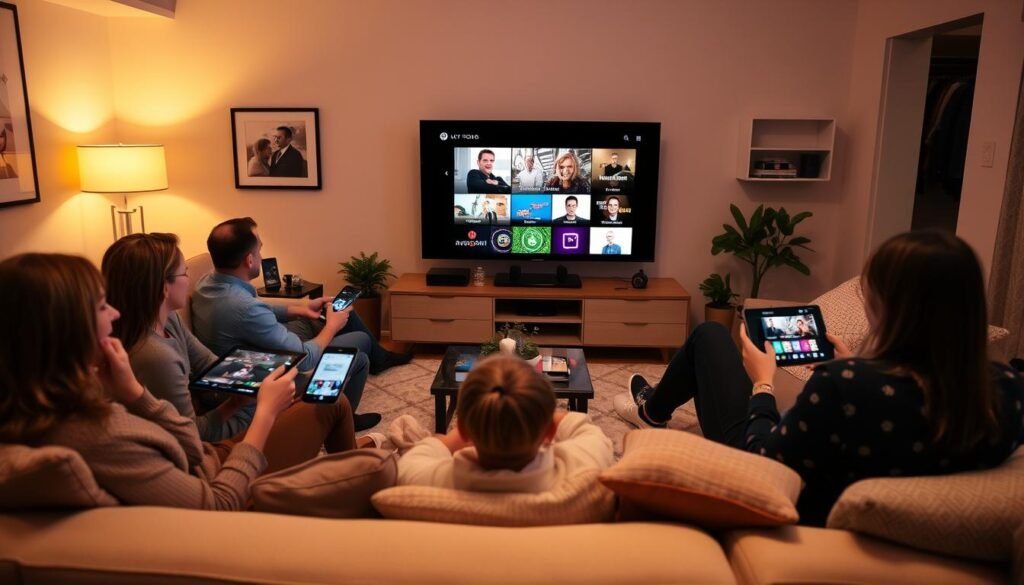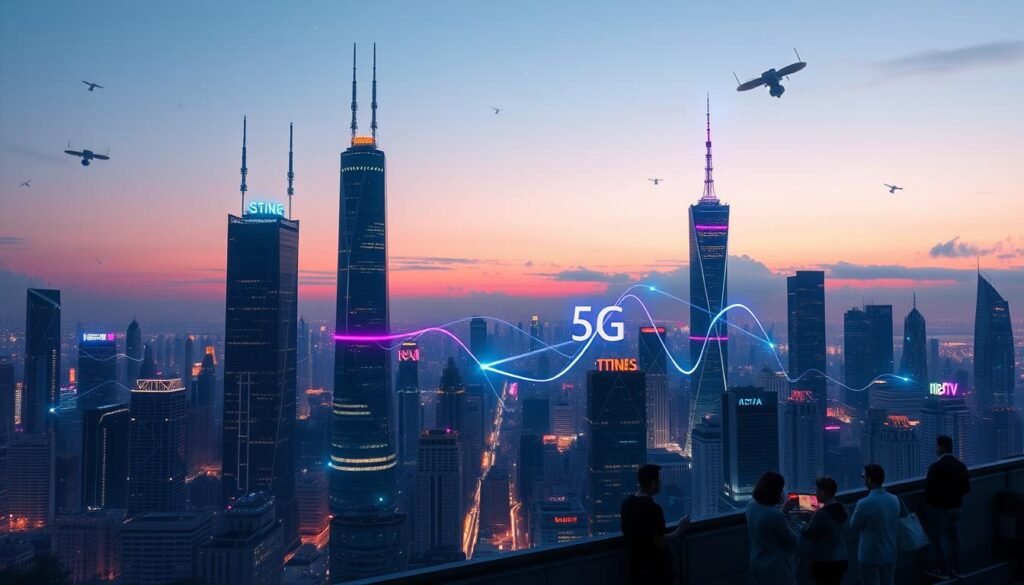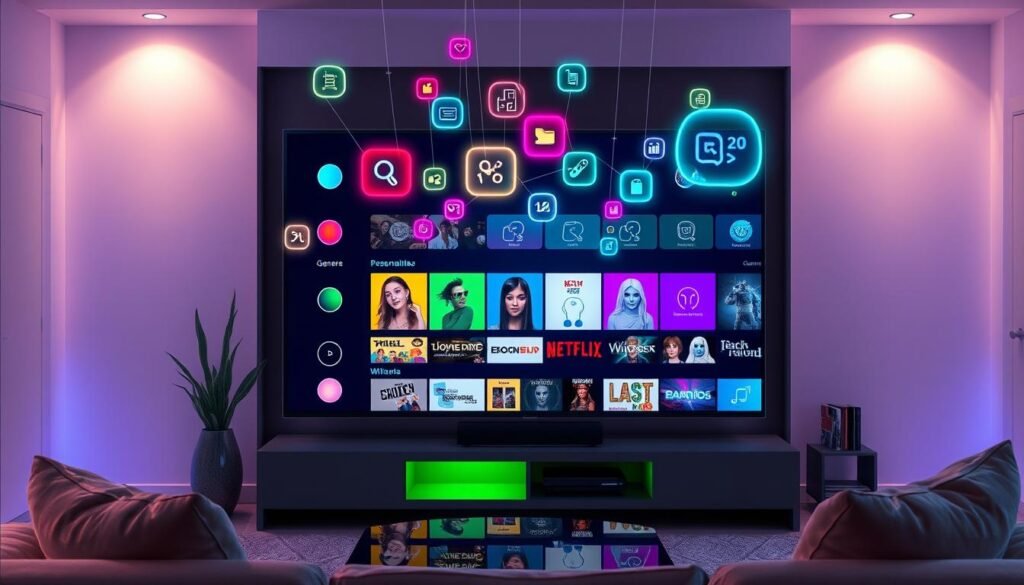The way we watch TV in the UK is changing fast. This is thanks to the growth of Internet Protocol Television (IPTV) and over-the-top (OTT) video platforms. More people are choosing internet TV for its ease and flexibility. This shift is leading to new trends that are changing how we watch and interact with TV shows and movies.
Key Takeaways
- The rise of OTT video platforms is challenging traditional cable TV, as consumers seek more personalised and on-demand content options.
- The shift towards multiscreen viewing is becoming the new norm, as viewers seamlessly transition between devices for a more immersive and connected experience.
- The rollout of 5G technology is set to enhance IPTV delivery, offering improved network speeds and enabling smoother streaming experiences.
- The integration of IPTV services into smart TVs is revolutionising the way viewers interact with their televisions, providing a more user-friendly and integrated experience.
- Personalised content recommendations, powered by artificial intelligence and big data, are becoming increasingly important in driving viewer engagement and satisfaction.
Exploring the Growth of OTT Video Platforms
The United Kingdom has seen a big increase in OTT (Over-the-Top) video platforms. Services like Netflix, Amazon Prime Video, and Disney+ have become very popular. This has led to fewer people using traditional cable TV as they prefer the ease and variety of online entertainment.
Rise of Streaming Services
Now, UK residents can choose from many streaming services. These offer a huge selection of movies, TV shows, and new content. People like watching what they want, when they want, on different devices. This makes streaming services very attractive.
Shift from Traditional Cable TV
Streaming services have become more popular, and cable TV is losing ground. People prefer the flexibility and value of OTT video platforms. These offer a more personal viewing experience, unlike the fixed packages of traditional cable.
“The rise of OTT video platforms has fundamentally transformed the way UK residents consume television content, offering greater choice, flexibility, and personalisation.”
Multiscreen Viewing Experience: The New Norm
Smartphones, tablets, and smart TVs have changed how people watch TV in the UK. Internet-based television (IPTV) lets users watch their favourite shows on many devices, at home or on the move.
The move to multiscreen viewing comes from the rise of internet TV. It gives viewers more freedom and control over what they watch. With IPTV, you can:
- Pause, rewind, and resume shows on different devices
- Watch different shows on screens in your home at the same time
- Find a huge range of on-demand content to watch whenever you like
Media companies are changing their services to meet the demand for multiscreen viewing. Big names like BT and Sky are adding new features. They make sure watching TV is smooth and personal, no matter the device.
“The ability to access and enjoy our content on multiple screens has become an essential part of the modern television viewing experience.”
The future of TV in the UK looks bright with more multiscreen viewing. New tech like 5G will make watching TV even better.

5G Rollout: Enhancing IPTV Delivery
The UK is getting ready for a big change with 5G technology. It will make Internet Protocol Television (IPTV) services much better. With faster speeds and less delay, watching TV will be smoother and more enjoyable.
Improved Network Speeds
5G is incredibly fast, with speeds up to 10 Gbps. This means IPTV can send high-definition and 4K videos easily. Viewers will get a flawless watching experience.
Enabling Seamless Streaming
- 5G’s low latency means less delay and buffering. This makes watching IPTV smooth and engaging.
- With 5G, more devices in a home can stream at the same time. This meets the growing need for watching on multiple screens.
- 5G lets IPTV providers offer cool features like interactive content and virtual reality. This boosts user interest and interaction.
As 5G spreads across the UK, IPTV services are ready to take advantage. They can offer better network speeds and seamless streaming. This will change how we watch TV for the better.
“The 5G revolution will unlock new possibilities for IPTV, paving the way for a future where content delivery is seamless, immersive, and tailored to individual preferences.”

Smart TVs: Revolutionising the Way We Watch
Smart TVs have changed how we watch TV in the UK. They bring IPTV services right to our screens. This means we can easily find lots of streaming platforms and on-demand shows. The easy-to-use interfaces make watching TV a breeze, especially for those who love technology.
Integration of IPTV Services
Smart TVs have ushered in a new TV watching era. They combine IPTV services, giving us access to many streaming options. No more switching between devices or using lots of remotes. Smart TVs make watching TV simple and fun.
User-Friendly Interfaces
The success of smart TVs comes from their easy-to-use interfaces. These are designed for today’s viewers, focusing on simplicity. Features like voice control and personalised recommendations make finding shows easy. This has changed how we use our TVs.
| Feature | Benefit |
|---|---|
| Seamless IPTV Integration | Access to a wide range of streaming platforms and on-demand content |
| Intuitive User Interface | Simplified navigation and content discovery |
| Voice Control | Hands-free control for a more convenient viewing experience |
| Personalised Recommendations | Tailored content suggestions based on user preferences |
Smart TVs are now the top choice for many UK homes. They combine IPTV services and easy-to-use interfaces. This has completely changed how we watch TV.
Personalised Content Recommendations
In the fast-changing world of IPTV, providers use AI and big data to give users content they’ll love. They look at what you watch, like, and care about. This way, they suggest shows and movies that fit your taste perfectly, making your viewing better.
Harnessing AI and Big Data
AI and big data have changed how IPTV finds and shows content. These systems use smart algorithms to find patterns in lots of user data. This helps them suggest shows that really speak to you.
- They look at what you’ve watched and like to find the best matches for you.
- They use machine learning to get better at making recommendations over time.
- Big data helps them spot new trends and suggest content that fits those trends.
By using these technologies, IPTV providers make sure you always find something interesting. This keeps you engaged and loyal to their service.
“The future of TV is all about personalisation. IPTV platforms that can effectively leverage AI and big data to deliver tailored recommendations will have a distinct competitive advantage.”
As IPTV grows, being able to offer content that fits each viewer’s taste will become key. Providers that invest in AI and big data will do well in the future.

| Feature | Benefit |
|---|---|
| Personalised Content Recommendations | Improved user engagement and satisfaction |
| Leveraging AI and Big Data | Enhanced recommendation accuracy and content discovery |
| Continuous Refinement of Algorithms | Adaptability to changing viewer preferences |
The Future of IPTV: Internet-based Television Takes Centre Stage
In the UK, internet-based television is becoming more popular. IPTV is set to be a big part of our digital entertainment future. New technology, changing what people want to watch, and the rise of streaming services will shape IPTV’s path.
More people are using over-the-top (OTT) video platforms. Services like Netflix and Amazon Prime Video have changed how we watch TV. They offer lots of on-demand shows and can be watched on many devices. This has made traditional TV stations add IPTV to their services.
The introduction of 5G in the UK will also boost IPTV. Faster networks and less delay will make streaming better. This will meet the demand for high-quality, uninterrupted TV. Smart TVs will also play a big role in making IPTV the top choice for watching TV.
Future IPTV will also be more personal. AI and big data will help suggest shows based on what you like. This will make watching TV more enjoyable and keep viewers coming back for more.
As the UK moves towards IPTV, internet TV will become the main way we watch. It will offer a better, more convenient, and more personal viewing experience for everyone.
“The future of television is undoubtedly internet-based, and IPTV will be at the forefront of this revolution.”
Advertising on IPTV: New Revenue Streams
The rise of advertising on IPTV brings new chances for making money. IPTV lets advertisers show ads to the right people. This is thanks to data and analytics that make sure ads reach the right viewer at the right time.
Targeted Advertising Opportunities
IPTV’s advanced features make targeted advertising possible like never before. Advertisers can now target their ads based on who the viewer is, what they watch, and where they are. This means ads are more effective and personal, making a bigger impact.
Innovative Ad Formats
IPTV is also trying out innovative ad formats that fit right into the show. From interactive ads to ads that are part of the content, these formats don’t get in the way. They make watching shows better for viewers and help advertisers reach their audience.
The future of advertising on IPTV looks bright. It’s always changing and finding new ways for content providers and advertisers to make money.
Regulatory Landscape: Challenges and Opportunities
As the IPTV landscape in the UK evolves, it brings challenges and opportunities. Policymakers and industry leaders must tackle complex issues. These include content licensing, data privacy, and integrating IPTV with current media rules.
One big regulatory challenge is getting the right content licenses. With many content providers and rights holders, it’s hard to navigate. It requires careful talks and following rules.
The regulatory opportunities in IPTV focus on new policies that support innovation and user-focused services. Policymakers can help shape rules that encourage investment, competition, and protect user privacy and data.
| Regulatory Challenges | Regulatory Opportunities |
|---|---|
| Content Licensing | Fostering Innovation |
| Data Privacy | Promoting Competition |
| Integration with Existing Media Regulations | Safeguarding User Privacy and Data Rights |
As the regulatory landscape changes, IPTV providers must stay flexible and proactive. By working with policymakers and industry leaders, IPTV can reach its full potential. It can offer exciting, user-focused experiences in the UK.
“The future of IPTV in the UK will be shaped by the ability of providers to adapt to the regulatory landscape and capitalise on the opportunities it presents.”
Conclusion
The future of IPTV in the UK is exciting and changing fast. We’ve seen the rise of OTT video platforms and a move to watching TV on multiple screens. The introduction of 5G and smart TVs is also making a big difference.
These changes are making TV watching more diverse and flexible for people in the UK. With 5G coming, we can expect even better streaming and faster speeds.
Now, IPTV is changing how we watch TV, thanks to smart TVs and AI. This means viewers in the UK can get content that’s just right for them. As IPTV keeps growing, it’s important for everyone to keep up with the latest trends and tech.

